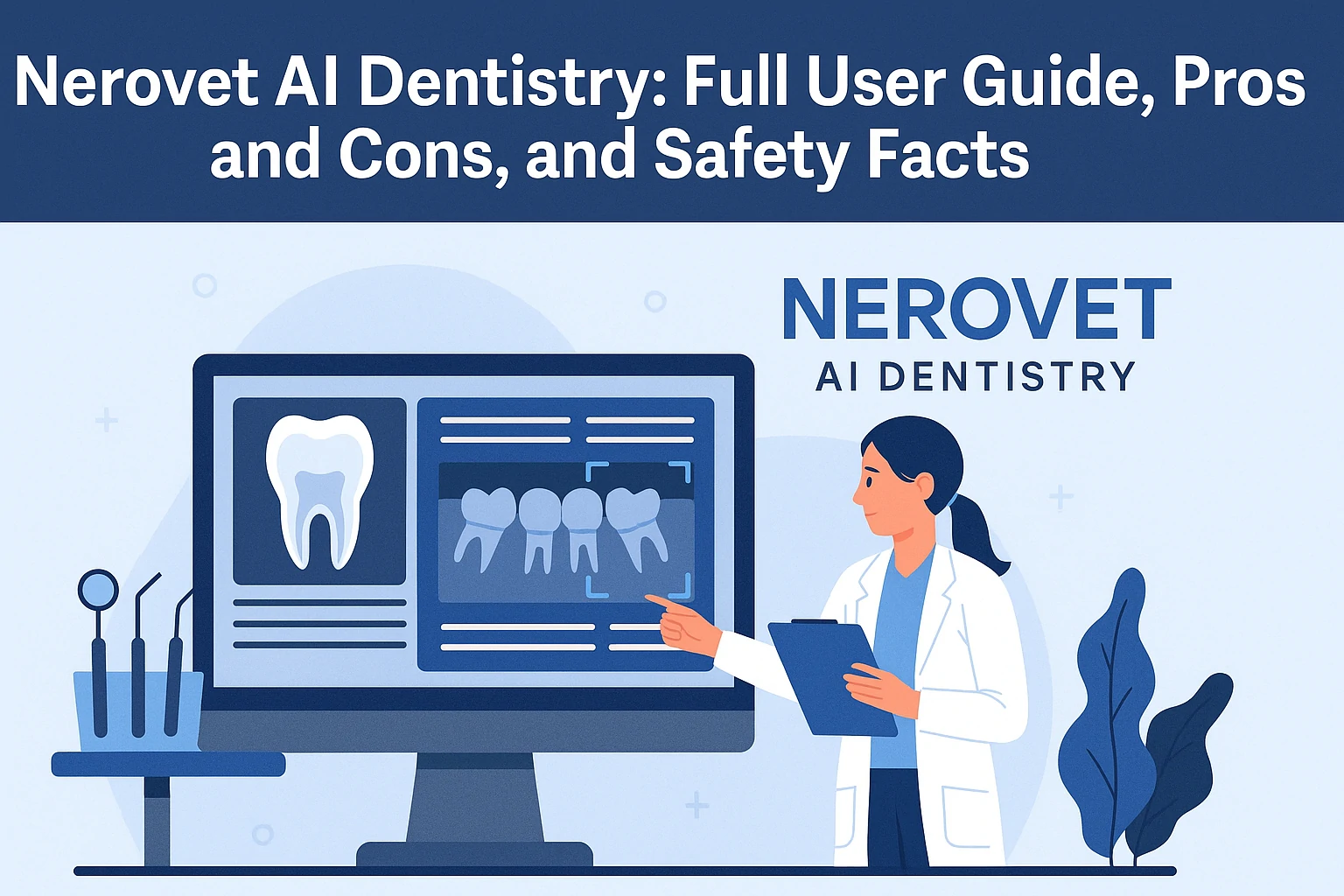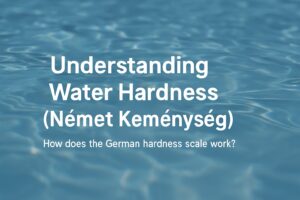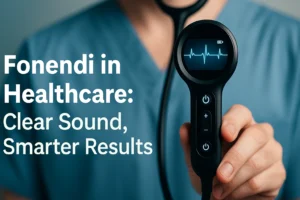Technology keeps moving forward. It now touches almost every part of our lives. Health care is no different. New tools promise faster results and better care. One such tool is Nerovet AI Dentistry. This system mixes artificial intelligence with dental care. Many people ask if it is safe or just another tech buzzword. Some say it will change how dentists work. Others want more proof.
Dentistry has seen slow changes in the past. Traditional tools still rule in most clinics. But the rise of AI brings a new wave. Nerovet claims to offer smart support for dentists. It helps with diagnosis, planning, and even patient communication. This may save time and reduce human error. Still, users need to know what they are signing up for.
Most people do not know how AI tools in dentistry work. They hear terms like “machine learning” and “predictive models” but do not understand what that means for their teeth. Patients must learn what this tool does, how it works, and what risks may come with it. Dentists must also be sure it fits well in clinical settings.
This article gives a full guide. It covers how Nerovet AI Dentistry works. It shows the pros and cons. It explains what safety concerns you should keep in mind. The goal is simple: help people make smart choices about this new dental tool.
What Is Nerovet AI Dentistry?
Nerovet AI Dentistry is a digital system. It uses artificial intelligence to support dental work. It claims to help dentists with diagnosis, treatment planning, and data review. The goal is to make care faster, better, and more accurate.
This system looks at data from dental scans, X-rays, and patient history. It finds patterns that may signal early problems. It alerts the dentist if it spots issues. These could be cavities, gum disease, or jaw problems. The dentist then reviews the alert and decides what to do.
Nerovet AI also helps plan treatment. It reviews the patient’s dental history. It suggests steps based on best practices. This saves time. It may also reduce mistakes. The AI does not replace the dentist. It acts like a smart assistant.
Some versions of the system include patient chat tools. These answer basic questions. They guide people through steps before and after care. The goal is to reduce confusion and help patients feel informed.
How It Works in the Clinic
When a patient visits a clinic that uses Nerovet, the experience may feel normal at first. The dentist still checks your mouth. You may still get X-rays. But in the background, the AI reviews the scans and data. It flags anything that looks odd. The dentist sees those alerts during the exam.
The AI tool does not make final calls. It only gives suggestions. The human expert remains in charge. That balance keeps things safe. It also means the AI cannot do much harm alone. Still, errors can happen if a dentist trusts the tool too much.
Nerovet connects to the dental records system. It learns from each visit. It improves over time as it sees more cases. This can help it spot rare issues. But it also means data privacy is key. If the system gets hacked, private health info may leak.
When Were Braces Invented? The Real Story Behind Straight Teeth
How Nerovet Compares to Other Tools
Nerovet is not the only AI tool in dentistry. Other systems, like Pearl and Overjet, also review scans and suggest care. Some tools focus on X-rays. Some help manage office work. Nerovet tries to do both.
Each tool works in its own way. Some are faster. Some cost less. Others may be easier to use. Clinics should test before they choose. Patients can ask if other tools are better for their care.
Pros of Nerovet AI Dentistry
Nerovet AI offers many possible benefits. These can help both patients and dentists. Here are some key advantages:
Faster Diagnosis: The AI can scan and review data fast. This speeds up the process. It saves time for both doctor and patient.
Early Detection: The tool may spot problems early. That gives people a better chance at simple treatment.
Less Human Error: Everyone makes mistakes. The AI may catch what a human misses. This adds a second layer of safety.
Smart Planning: It helps dentists choose the best steps for each case. That leads to better care.
Patient Support: Chat tools and tips can help nervous or confused patients. This improves trust.
Learning Over Time: The more data it sees, the smarter it gets. It learns patterns from many people.
Cons and Risks
No system is perfect. Nerovet AI Dentistry has risks and weak points. Here are the major ones to know:
False Alarms: The AI may flag something that is not a real problem. This can cause stress or lead to unneeded checks.
Missed Issues: AI may also miss some dental problems. That delay can lead to harm.
Too Much Trust: If a dentist relies on the AI too much, they may stop double-checking. That can lead to mistakes.
Privacy Risks: The tool uses patient data. A data leak can expose sensitive health info.
Cost and Access: Not all clinics can afford it. Patients in small towns may not see these tools.
Lack of Proof: Some claims are not backed by strong studies. Users must check for real results.
Does It Cost More to Use Nerovet?
AI tools cost money. Clinics pay to use Nerovet. This may raise the price of care. Some clinics add tech fees. Others raise checkup costs.
You should ask if the AI system adds to your bill. Some plans may not cover it. If you pay out of pocket, know the price in advance.
Safety Facts You Should Know
Safety is the top concern in health care. AI tools must meet high standards. Nerovet claims to follow rules for data security and patient care. But users must ask questions.
Before you trust any AI tool, ask these things:
- Who made the tool? Do they have a good record?
- Is it approved by health groups?
- Has it been tested in real clinics?
- How does it protect data?
- Can you opt out?
Most tools use strong encryption. That means they lock the data. Only people with permission can see it. But no system is 100% safe. Clinics must keep software up to date. They must train staff on how to use it right.
As of now, Nerovet has not shared full public test results. This makes it hard to judge how safe it truly is. Until more data is shared, people should treat it with care.
Who Takes the Blame if It Fails?
AI does not work on its own. Humans still guide it. But what happens if the tool fails? What if it misses a serious problem?
In most cases, the dentist takes full control. That means they carry the risk. Still, clinics must use the tool with care. They must teach staff. They must fix errors fast. No one should blame the AI alone.
Who Approves AI in Dentistry?
AI tools in health care must follow strict rules. In the U.S., the FDA checks some systems before clinics use them. Some tools pass as medical devices. Others fall outside those rules. Nerovet has not shared clear approval records yet.
Each country has its own laws. Some need full tests. Others do not. Before you trust any AI tool, ask if it passed official checks. Ask your clinic if the system is approved or under review. That step adds a layer of safety.
How to Spot a Clinic That Uses AI Safely
If your dentist uses Nerovet, you can ask how it works. Ask what it does and what it does not do. You have the right to understand how your care is handled.
You may notice faster exams. You may get better answers to questions. You may also see more tech tools, like tablets or on-screen charts. These all aim to make the visit smoother.
You should not feel rushed or forced into treatment. The dentist still makes the call. The AI is only one part of the process.
Always ask for a second opinion if you feel unsure. Ask what other choices you have. Good care means clear talk and smart steps. AI can help, but it should not replace real human care.
You can tell if a clinic uses AI the right way. Good clinics explain the tech. They do not hide it. They answer questions in plain words.
Look at how the dentist works with the tool. Do they check alerts before they act? Do they give you time to ask about it? That shows they use AI to help-not to rush care.
What Real People Say About It
Some clinics already use Nerovet. A few say it cuts time during exams. One team said it flagged small issues that helped catch decay early. Another said setup took weeks, but the results made it worth it.
Not every clinic feels the same. Some say the tool needs updates. Others want more control. You should ask your dentist what they like or dislike. Real answers tell more than ads.
What Dentists Should Know
Dental clinics must train their staff before using Nerovet. The tool needs proper setup. The data it gets must be clean. If records are wrong or missing, the AI may not work well.
Clinics must update the software often. That keeps the system safe and smart. They must also follow privacy laws. This includes getting patient consent and guarding data.
AI tools need limits. The dentist must stay in charge. They should use the AI as a guide, not a rule. The human touch still matters in dental care.
Dentists should watch how the AI behaves. They should note any wrong alerts or bugs. They should report problems to the maker. This helps the system get better.
Where This Tech May Go Next
AI in dentistry is still new. It may grow fast. Future tools may help with surgery, 3D printing, or real-time guidance during complex care.
Nerovet may add voice tools. It may allow full speech control during exams. That could help dentists who work solo.
Some clinics may connect Nerovet with patient apps. These could track care steps at home. They could send alerts when it’s time for a visit. This would boost follow-up and reduce skipped care.
In the future, AI may help teach new dentists. It may show case examples and give fast feedback. This could improve training.
But to get there, it must prove itself. More tests, more studies, and better safety checks are needed.
Will Insurance Cover This?
Most insurance plans do not list AI tools in their codes. If Nerovet adds cost, your plan may not cover it. Some plans pay for exams, not tools used in them.
Ask your dentist or insurance provider. Find out if AI-based care changes your cost. Do not wait for a bill to find out.
Ask the Right Questions Before You Trust It
Before you say yes to AI dental care, ask questions. What does the tool do? Is it approved? How much will it cost? Who controls the data? The more you ask, the safer your care will be.
Final Thoughts
Nerovet AI Dentistry is a bold new tool. It could help make dental care faster and more accurate. It may lower human error and improve planning. But it also brings risks. These include wrong alerts, privacy issues, and too much trust in tech.
Patients and dentists must work together. They must ask hard questions. They must check facts. Only then can this tool be safe and useful.
AI is not magic. It is not perfect. But used the right way, it can support human skill. That mix of brain and tech may shape the future of dental care. Until then, caution and care must guide the way.
Users must ask hard questions before trusting any AI system. As the Helvetic Clinics scandal shows, lack of transparency and poor oversight can lead to major harm, even in high-end dental settings.
This article is for informational use only. It does not offer medical or dental advice. Always speak with a licensed dental professional before making any treatment decisions.




